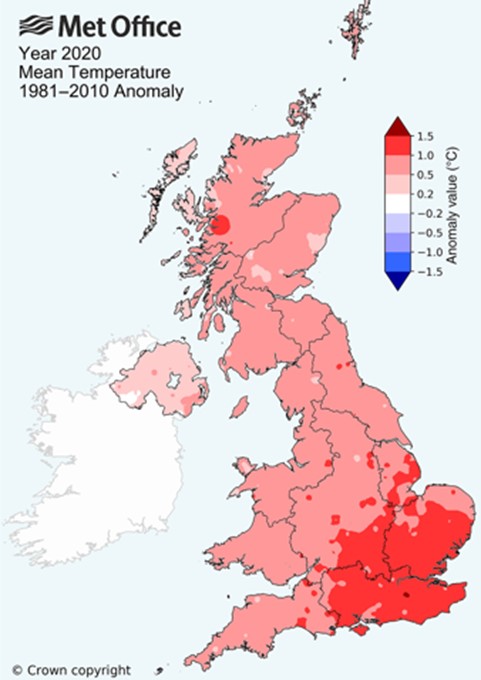Author Dr Paul Lunt, Director of the Low Carbon Devon Project
As we approach the winter solstice, it is a good time to review our winter weather. It is so far so good for my favourite garden plant, the giant viper’s bugloss (Echium pininana). This plant, photography at my south Devon garden at 100 m above sea level, is endemic to the Canary Islands with limited tolerance to UK winter frost. Whether it survives through to the spring, as it has done in previous years, is yet be seen. The fact that I am willing to take a chance on a plant whose natural home is a semi-tropical group of islands over 2000 km to the south speaks volumes of the changes that have occurred in the UK climate.
Since the industrial revolution average global surface temperatures have risen from ~15°C to ~16 °C, a rise of 1 °C. In some parts of the world, such as the Arctic Circle, temperature rises have been higher, up to 2 °C. Globally, 2010-2020 was the warmest decade on record. Warmer air masses have the potential to hold higher % water contents. On average for typical ambient summer air temperatures a 1 °C temperature increase can result in up to a 7% increase in atmospheric water content and therefore an increase in the intensity of rainfall.
In the UK, recent decades have been warmer, wetter and sunnier than those in the 20th century. The last decade, 2011–2020, was on average 4% wetter than 1981–2010 and 9% wetter than 1961–1990. UK summers during 2011–2020, were on average 15% wetter than 1981–2010 and 17% wetter than those of 1961–1990. Since 2009, the UK has had its wettest February, April, June, November and December on record in a monthly series going back to 1862, as well as the wettest winter on record.
The most recent decade (2011–2020) has been on average 0.5 °C warmer than the 1981–2010 average and 1.1°C warmer than 1961–1990 (Figure 2), with warming across all months and slightly less warming in the northern and western half of the UK. All the top 10 warmest years for the UK in the series from 1884 have occurred since 2002. In the most recent decade (2011–2020) the UK has had on average 4% more sunshine hours than the 1981–2010 average and 8% more than the 1961–1990 average, with springs recording the greatest increase.

Climate change is unequivocal but much like weather, predicting climate is complex and relies on probability rather than certainty. Climate change models predict how likely the climate is to change in a geographical area within a given timeframe. With warming there is still a probability in any one year that there will be a cold spell but with climate change the probability of a cold spell becomes lower.
Find out more about the Low Carbon Devon Project.

My favourite garden plant as well. I always pot up half a dozen small plants and put them in the greenhouse to be on the safe side. I have other sub-tropical plants growing outside that survive all but the harshest weather.